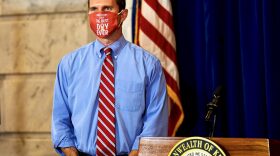Gov. Andy Beshear says he was passing along guidance from the federal government when he told folks who left work over fear of the coronavirus to self-quarantine to apply for unemployment insurance.
That federal guidance changed about a month later, according to a statement from Beshear’s office in response to a KyCIR investigation which found Kentucky’s unemployment office is kicking people who met that criteria off unemployment benefits and billing them for “overpayment” debt.
It’s unclear if state officials ever communicated the change to out-of-work Kentuckians after the state received new guidance in April. The state’s “frequently asked questions” page about unemployment insurance benefits still says that Kentuckians with a reasonable fear of contracting coronavirus are eligible, if their employer hasn’t offered telework or reasonable accommodations.

Beshear’s office didn’t respond to a request for an interview for the investigation, and the statement was provided by Beshear’s spokesperson after the story published. It says that the U.S. Department of Labor sets eligibility rules for unemployment insurance. The initial communications from the federal government was that individuals who left work because of concerns about their health or possible exposure to those living with them would qualify for unemployment, the statement said.
“Based on that, the Governor passed along that same message and encouraged people who met the standards the federal government was applying to sign up for unemployment.”
The U.S. Department of Labor has not responded to requests for comment.
Beshear on March 25 said during his daily briefing that the state was expanding unemployment benefits to include the self-employed and people who self-quarantined because they had a reasonable fear of contracting the virus at work. Just weeks into the pandemic, and with the unemployment office understaffed to deal with hundreds of thousands of Kentuckians out of work at once, briefings and the state’s web sites were the primary sources of information about changes to who could file.
Tracy Hayes filed a claim for unemployment benefits two days after Beshear offered the option to self-quarantine and receive benefits. She was approved and paid benefits for eight weeks before the unemployment office opened an investigation. The state ruled that Hayes was retroactively ineligible because she was on a leave of absence and, in May, she learned she would have to pay back the $5,000 in unemployment benefits she had already spent.
Beshear’s statement says this happened because of the federal government’s changing guidance, and that Beshear understood why Hayes challenged the overpayment debt in a lawsuit filed in the Monroe County Circuit Court. He said he “hopes the federal government will reverse course so that she and others do not have to experience this hardship.”
“On April 27, the federal government changed its position and removed any legal ability for the state to provide unemployment assistance benefits on this basis alone,” the statement said. “Gov. Beshear disagrees with the federal government and believes that individuals can and should qualify on this basis, but Kentucky’s unemployment insurance office is obligated to follow federal law.”
It is unclear that the new guidance was ever passed along to the rest of Kentucky. A spokesperson for the governor’s office did not know if the policy guidance had been discussed at a daily briefing.
KyCIR reviewed Beshear’s briefings on April 27, 28, 29 and 30 where unemployment benefits were discussed. There was no mention that people who leave jobs to self-quarantine were no longer eligible.
The state’s website still describes a scenario where someone like Tracey Hayes should be eligible to apply for unemployment insurance.
Federal Shift Confuses States
Early guidance from the federal Department of Labor gave states flexibility to extend unemployment benefits for those who quarantine out of fear of catching the virus at work, says Michele Evermore, an unemployment policy expert at the National Employment Law Project.
Evermore said the federal department of Labor did issue conflicting guidance that became less permissive as it became clear the pandemic was not going away anytime soon.
“By the end of April they started walking some of that openness back,” Evermore said.
Evermore said even still, confusion surrounds the question of what defines a reasonable risk of exposure to the virus that would make someone eligible for unemployment benefits.
“The question has been, now and throughout the pandemic, what’s a reasonable fear versus what’s a reasonable threat,” Evermore said. “And that line has never been made clear.”
Evermore said its likely other states are pursuing overpayment debts for people who self-quarantined, especially as the immediate unemployment crisis lessons.
One key difference: Most other states have passed laws allowing their unemployment agencies to waive state overpayment debts for equity and good conscience reasons, such as if a claimant doesn’t have the money to pay or if the debt stems from an agency error. Kentucky is one of just 10 states without such a statute, so Kentucky is obligated to pursue any and all overpayment debts, regardless of how they come about.
All states are bound to pursue overpayment debts connected to federal unemployment insurance programs such as the Pandemic Unemployment Assistance program created by the CARES Act. Beshear’s statement notes that Kentucky is requesting flexibility to waive overpayment debts for those who self-quarantined.






